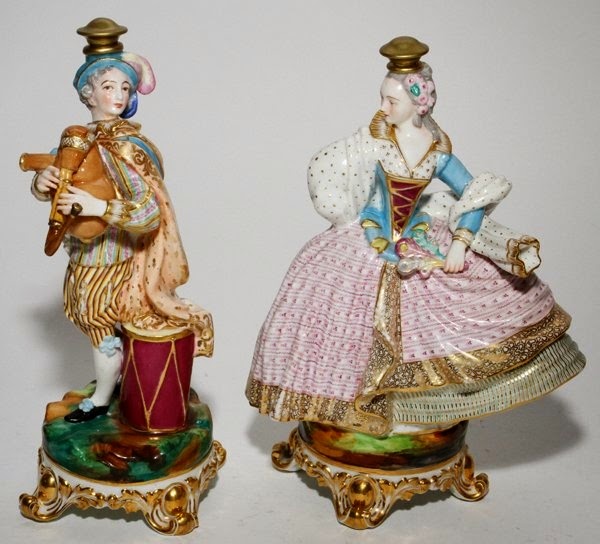The allure of applying scent has been capturing attention since the world’s earliest days. Ancient writings found in Persia, Iraq (Mesopotamia), Cyprus, Egypt, Israel and Rome, as well as the Far East and India, mention perfume industries that once thrived in these areas. Along with the perfumes came the need for scent containers. Egyptian tombs yield beautiful examples of these bottles for holding scent.
One of the nicest things about collecting antique perfume bottles is that the choices presented are nearly infinite. Perfume bottles can easily be found in cut glass, pressed glass, art glass, silver, metal, enamel, porcelain and believe it or not plastic. In collecting perfume bottles there is a price for everyone. They can range in price from a few dollars to thousands depending on their medium and condition.
This blog post is about my favorite antique perfume bottles, the porcelain ones manufactured in the 18th century.The frivolity and luxury of scent were reflected in eighteenth-century charming "toys", made at the Chelsea factory. These popular perfume bottles were produced in the shapes of various figures, animals, fruits, and other objects. Its early soft-paste porcelain products were aimed at the aristocratic market. Just like trends today the craze for these charming items flourished. They did not come with perfume inside. Liquid fragrance was purchased separately and then decanted into one’s favorite bottles.
Even though these antique porcelain perfume bottles are pricey, other styles are more reasonable and still fun to collect. Despite the way the collector begins, people should never forget the main reason for collecting in the first place - The sheer enjoyment. If you are looking for something to collect these tiny treasures may just be the ticket.
Enjoy the 18th century!!
Perfume bottle and stopper from the Chelsea Porcelain factory.
The Chelsea porcelain manufacturer was the first important porcelain manufacturer in England. The factory produced decorative pieces for the luxury market,often copying designs from factories at Meissen in Germany or from Vincennes and Sèvres in France. These included miniature items, called 'toys' at the time, such as these perfume bottles, as well as seals, thimble cases, snuff boxes and other expensive trifles. Many have amorous or flirtatious inscriptions on them and were often bought as gifts.
The Chelsea porcelain manufacturer was the first important porcelain manufacturer in England. The factory produced decorative pieces for the luxury market,often copying designs from factories at Meissen in Germany or from Vincennes and Sèvres in France. These included miniature items, called 'toys' at the time, such as these perfume bottles, as well as seals, thimble cases, snuff boxes and other expensive trifles. Many have amorous or flirtatious inscriptions on them and were often bought as gifts.
Jacob Petit Porcelain figural perfume bottles.
Antique perfume bottles are often miniature works of art in themselves. Perfume bottles have captured the attention of the public every bit as much as the perfumes did due to their unusual beauty.
Beautiful porcelain perfume bottles were meant for display, and these bottles would have stood proudly on a lady’s dressing table.
The perfume bottles are made of soft-paste porcelain, painted in overglaze colours and gilt, with gold mounts.
Perfume bottle and stopper from the Charles Gouyns factory.1749-1754, London, England. The bottle and stopper of porcelain, painted with enamels, in the form of figure of a lady dancing, and mounted in gold.
Exquisite harp perfume bottle. Probably enamel instead of porcelain but I had to share it anyway!
Perfume Bottle circa 1760 English (South Staffordshire) Enamel on copper.
These small compact vessels are easy to love due to their size, and the multitude of interesting mediums and attractive shapes they display.
Perfume Bottle, 1800s - Chelsea Porcelain Factory, made of porcelain with gilt metal mounts.The Chelsea Porcelain factory put most of its energy into porcelain perfume bottles.
via pinterest
Stunning circa 1860 French perfume bottle.
Porcelain perfume bottles ruled through the 18th Century. Their delicate refinement is hard to equal.
Perfume Bottle, late 1700s manufacturer Staffordshire Factory (British) enamel on copper with gilt metal mounts.
The aristocratic lady had a wide choice of scent bottles, including dual-purpose bottles which also held smelling salts.
The aristocratic lady had a wide choice of scent bottles, including dual-purpose bottles which also held smelling salts.
Some porcelain perfume bottles possessed intriguing stoppers that were sculptures of a woman's head, a flower, or a bird; many were artist-designed and one-of-a-kind.
A collection of perfume bottles can be put to charming use on a contemporary dressing table or displayed in a group on a table in any room.
A Palais Royal Perfume Bottle.
Untill about 100 years ago decorative bottles were sold empty so the lady could
bring her own perfume bottles to the apothecary to be filled.
with her favorite scent.
A 19th century French porcelain perfume bottle.
via Pinterest
Chelsea Porcelain Perfume bottle: The Three Graces
In the 18th century porcelain was used to make perfume bottles, but glass is used exclusively to make perfume bottles today.
Fountain Shaped Porcelain Scent Bottle, Chelsea Porcelain Factory English
The number of different kinds of antique perfume bottles available for collection is astounding. Beginners who wish to specialize can choose from a wide range of bottles.
Perfume Bottle by Jacob Petit France Circa 1835
Though perfume bottles have been around for centuries, most people just collect those from the last 200 years or so. They are more readily available, interesting and affordable. Remember not just one company produced these lovelies but multitudes produced them, so it makes for quite a number on the market.
Click here to see the previous post
This blog post was published by Lisa Farmer






















